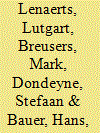| Srl | Item |
| 1 |
ID:
146119


|
|
|
|
|
| Summary/Abstract |
The Mozambican Land Law of 1997 intends to provide flexible rules of access to land, while securing local people's customary rights, as well as equal rights for women and men. Drawing on participant observation during a ‘land delimitation’ process in central Mozambique, this article analyses the complex negotiation ensuing from the implementation of the Land Law in a local community. It shows how the delimitation process provided spaces for asserting – male – roles of power and authority, while local women were increasingly marginalised in the process. By presenting oral testimonies from women in the community, the authors seek to balance the account, providing women's perspectives on the highly gendered character of interests in, access to, and exclusion from land. The analysis ends with the question: What would be required to provide a space for local women to articulate their interests in a secure access to land during the delimitation process itself?
|
|
|
|
|
|
|
|
|
|
|
|
|
|
|
|
| 2 |
ID:
131792


|
|
|
|
|
| Publication |
2014.
|
| Summary/Abstract |
The role of post-1991 ethnic-based federalism on conflicts along regional boundaries has been a topic of great dispute in Ethiopianist literature. This article sheds new light on the on-going debate based on original ethnographic material from the Afar-Tigray regional border zone. Contrary to other studies, conflicts appear to have reduced in that area. Two key questions are addressed: how do different groups lay future claims to land; and which role does the post-1991 government play in those claims to land and in reducing conflicts? The case study reveals that people materialise religion to lay future claims to land and that conflicts have reduced with increased involvement of the state over the past two decades, but that this reduction has come at a high cost and may therefore not be sustainable in the long term.
|
|
|
|
|
|
|
|
|
|
|
|
|
|
|
|